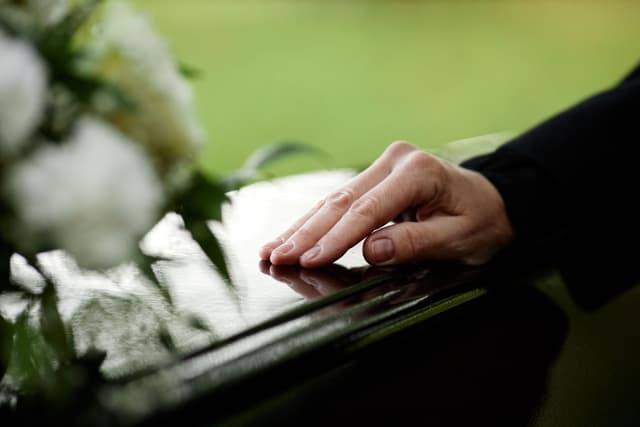
Joe McCoy is an award winning trial lawyer with an ever-growing record of legal victories and accomplishments. He has won seven figure settlements and judgments for people harmed by corporate greed, neglect, and carelessness. Joe is excited to bring his record of success to Michael Hill Trial Law, where he can devote his efforts exclusively to holding nursing homes accountable when they abuse and neglect our society's most vulnerable members.
Prior to law school, Joe attended Grove City College in Pennsylvania where he was a four-year letterwinner, three-year starter, and two-year captain of the basketball team. Joe is proud of leading the basketball team to multiple league titles and a NCAA Division III tournament berth. Joe remains in the College's record books for three pointers made and free throw percentage. Joe also ran the Steeplechase for the track team.
The son of a lawyer, advocacy is in Joe's blood, and he knew early on he would pursue a career in law. In law school, Joe received several awards and honors as the highest achieving student in numerous legal areas, including Constitutional Law, Property, Legal Writing, Professional Responsibility, and Trial Advocacy.
After law school, Joe began his journey as a trial lawyer working for a prominent law firm that defends cases against doctors, dentists, and nursing homes. While gaining valuable trial experience and learning the legal maneuvers of how these cases are defended, Joe quickly realized that his heart was on the side of the injured person and family of those who had been neglected. Joe never looked back after changing sides to stand up for and help restore the lives of people who have been neglected or abused.
Joe's legal talents have been recognized by his peers, and he has been voted a Super Lawyer Rising Star from 2021 through the current year, an award only the top 2.5% of lawyers receive. Always on a mission to hone his craft as a trial lawyer, Joe continues to build his skills in the rigorous invitation-only Trial Lawyers University Skills Boot Camp.
Joe is an invited guest at trial lawyer conferences around the country. In his personal life, Joe is an active member of his community with experience serving as a board member for several organizations, including the Licking County Board of Developmental Disabilities. Joe is also a proud participant of Pelotonia, an annual 100 mile bike ride to support cancer research. For the past several years, Joe has served as a Trustee for the Ohio Association for Justice, an organization dedicated to protecting and promoting the Constitutional Right to a civil jury trial.
Joe lives in historic Granville, Ohio, with his wife, Tisha, and their four children. With great memories of playing college athletics, Joe still enjoys playing basketball, tennis, and cycling in his free time, as well as coaching his children in various youth sports.
view all resources

Few injuries are as troubling — and as preventable — as bedsores in nursing homes. Also known as pressure ulcers or pressure injuries, bedsores can develop when a resident remains in the same position for extended periods without proper movement or care. At Michael Hill Trial Law, we frequently work with families who are devastated to discover that a loved one developed severe bedsores while under professional supervision.
In many cases, bedsores are not simply a medical complication of aging. They are a warning sign of neglect, understaffing, or failure to follow basic care standards. Understanding how bedsores develop, when they may indicate negligence, and what legal protections exist in Ohio can help families take informed action.

Losing a loved one is always painful. Losing a loved one because of preventable neglect or negligence in a nursing home is devastating. At Michael Hill Trial Law, we speak with families who are not only grieving — but also struggling with the painful question: Could this have been prevented?
While many nursing home residents have serious medical conditions, that does not mean facilities are free from responsibility. When a nursing home’s failure to provide proper care leads to a resident’s death, families may have grounds for a wrongful death claim under Ohio law.

When families place a loved one in a nursing home — especially someone living with Alzheimer’s disease or dementia — safety is the top priority. One of the most dangerous risks these residents face is wandering, sometimes called elopement, when a resident leaves a supervised area or exits the facility without proper monitoring.
At Michael Hill Trial Law, we have seen how devastating wandering incidents can be. Residents who leave a facility unsupervised may suffer falls, exposure to extreme weather, traffic injuries, dehydration, or worse. In many cases, these incidents are not unavoidable accidents — they are the result of preventable safety failures.

When families place an elderly loved one in a nursing home, they focus primarily on safety, medical care, and quality of life. Financial protection is often overlooked — until something goes wrong. At Michael Hill Trial Law, we regularly speak with families who discover too late that a loved one has been financially exploited while living in a nursing home.
Financial exploitation of seniors is one of the most underreported and misunderstood forms of elder abuse. It can quietly drain savings, create long-term financial instability, and cause deep emotional distress for elderly residents who may already feel powerless. Understanding how financial exploitation happens, what warning signs to watch for, and how families can take action is critical to protecting vulnerable seniors.